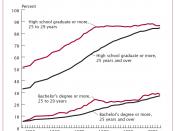How would you want to work at McDonalds the rest of your life? When someone drops out of high school there is a good chance that is where they will end up. Dropping out of high school with an educational background of the tenth grade can significantly reduce your choices in future job opportunities.
Approximately fifteen to twenty percent of young people in the twenty nine nations of the Organization for Economic Co-operation and Development (OECD) leave high school without receiving a diploma. These particular individuals have probably since discovered the endless frustrations of trying to get ahead without that significant piece of paper. Studies from around the world document the economic challenges faced by those who drop out of high school. Most employers tend to consider job applicants only if they hold a General Education Development or a high school diploma. In Canada, for instance, the unemployment rate of high school drop outs is nearly three times that of university graduates (12.5%
v. 4.8%). In addition, the rate at which individuals find adequate work after leaving school tends to predict their future success. A poor start in the labor market can be hard to overcome.
Drop outs who actually do find work must accept lower pay and very limited opportunities for advancement. A study of educational attainment in the United States found that university graduates earn significantly more per year than high school graduates: fifty four percent more for men, and eighty eight percent more for women (Wirt par. 3). Faced with theses economic realities, high school drop outs may later seek high school diplomas or equivalents as stepping stones to higher education and better employment opportunities. Why drop out only to go back to school when you are much older and could have a family to care for.


